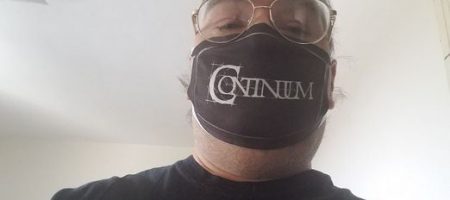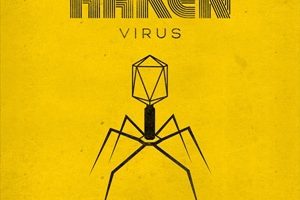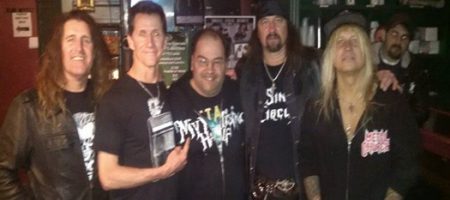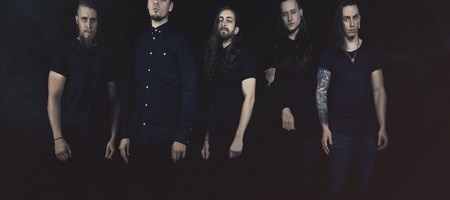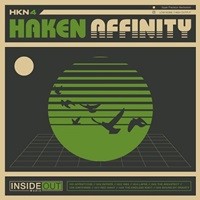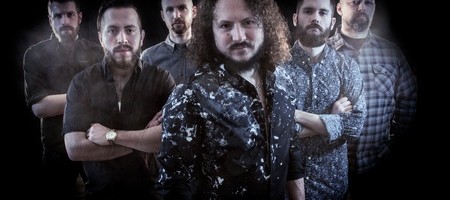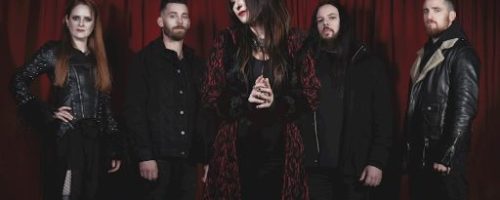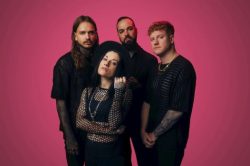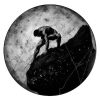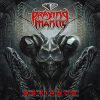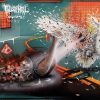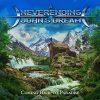Haken – A Viral Message
Monday, 25th May 2020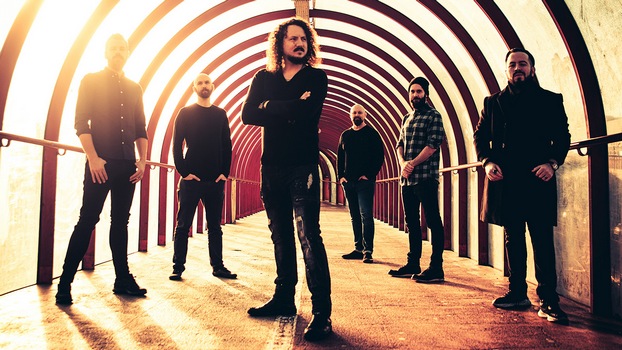
Unbeknownst to Haken, this progressive metal unit recorded their sixth studio album entitled Virus at a time that would affect the world – and themselves – in an unprecedented manner. Having to pull themselves off tour with Devin Townsend across North America midway through due to the coronavirus epidemic, they now have an album release hitting the streets with no idea when they will be back in front of live audiences to support it. Maybe this will be a time for their fans – and new listeners – to delve deep into the record though, as it’s another outstanding juggernaut for those who love heavy guitars, intricate interplay between the musicians, and textures that include everything from djent to blast beats, layers of vocal harmonies, and fluid musicianship.
We reached out to vocalist Ross Jennings who was more than happy to fill us in on the behind the scenes work for the new record. He also let us in to the band chemistry, his interpretative lyrical content, the long-term respect and relationship they have with their record label, and also a bit about his other band Novena.
Dead Rhetoric: Virus as the sixth Haken album continues to push forth an adventurous progressive metal sound with fabulous musical interplay and versatility as far as influences/ tones you explore. Where do you see this album slotting in the band’s career, and how do you feel about the process of developing/shaping this material after 13 years together as a band?
Ross Jennings: Good question. I hope and feel a natural progression of what’s come before. We are always trying to up our game and improve upon our last work and make the next album the best. I always say to myself that the next album I’m going to make is going to be even better than the last one. It was really fun to make this album, a lot of it came together near the end with all of us on the tour bus during the Devin Townsend tour, we had a lot of down time and spent that honing in on bringing it to the finish line. Although we had a lot of demos for this record in the works from when we were writing Vector way back then, when we got together as it’s quite rare for all of us to be in the same room at the same time when we are not on tour, specifically doing writing periods, I think that benefited the album in the end.
We were able to bounce ideas off each other and be able to make decisions on the fly rather than waiting days or weeks going back and forth across emails. That’s been key on this record.
Dead Rhetoric: When talking to your drummer Ray a few years back for another interview, he mentioned that the songwriting often changes at the last minute, causing you to have to switch things up on the fly as you are developing lyrics and melody lines. How have you personally handled this process, and does it allow you to feel comfortable working under the gun so to speak?
Jennings: Actually I quite enjoy that, really, on the fly process as you speak of. This happened a lot in the situation I was referring to on the bus. On a few occasions we make really drastic decisions, take the melody on a left turn. I would have specific lyrics written for a certain rhythm pattern, and that would be flipped on its head so I’d have to come up with something new, a set of words to convey a new meaning. In a way, that challenge is kind of fun, and keeps you on your toes for sure.
Dead Rhetoric: As a singer, you match the mood of the music brilliantly – using a lot of your lower register in measured ways for songs like “Invasion” and “The Strain”. Are you conscious of your abilities and your responsibilities to keep things unique and memorable, especially if your fellow bandmates deliver mesmerizing and intricate progressive passages underneath what you are doing?
Jennings: Yeah, absolutely. Obviously those guys are killing it at their respective instruments, so my responsibilities are a little different. I don’t have to worry about playing lots of notes and playing them very fast. The emotional delivery is key, and what you said about being memorable is key there. That’s one of the factors and things we consider going into a project like this. Each song, there are two mandates – finding those earworms in the melodies are essential to us, and the strong, powerful and effective riffs in the guitar work is the secondary one. The overall song of course is important.
I’m aware of my capabilities, and there is a lot of trial and error at the stages of writing songs. If something is looking like it’s going to be a challenge, I see that as a challenge rather than dismiss it. I don’t think there was anything necessarily on this album that pushed me, there have been some nice interesting sections, certainly in “The Messiah Complex” that was a true beast to put together.
Dead Rhetoric: You mention “The Messiah Complex” – how did the five parts come about? Was it intentional the way the sections were divided out?
Jennings: The story that’s being told – if you were reading through the lyrics it may be more obvious – we divided it into chapters but musically there are significant left turns in the song. We felt like it would be a cool thing to divide that up, and people if they want can skip to their favorite moments. The way people can see music these days, that’s another factor that brought us to this decision. Listeners will have the options to listen to it as a long piece, much like “Visions” or “Crystallised” or “Celestial Elixir” – and at the same time, the individual parts can be enjoyed just as well.
Dead Rhetoric: As far as the vocals on this record, did you gain inspiration from Yes during their 90125 album for some of the harmonies and layers?
Jennings: Always! (laughs) I hear what you saying, Yes are a big influence vocally for sure – Jon Anderson is a legend. What they did as a group as well, the vocal harmonies are very special. I think that subconsciously seems to seep through on some of our works. To be honest, it’s approached more from a technical angle rather than referring to specific bands. It’s more about the music theory, then trying to replicate anything like that. There is a certain timbre in my voice that is like Jon Anderson, I get that a lot from people.
Dead Rhetoric: What sources do you draw from when you pen your lyrics – as from what I understand, you enjoy leaving things open to broader interpretations even if things are in a narrative or thematic development?
Jennings: Yes, it’s a tricky one. I don’t think there is a specific reference for me, in regards to other work. It’s coming from my head, or the divine. It’s a conscious thing for sure – I absolutely know what I’m talking about when I’m writing the lyrics, and I wrap them up in a cryptic way which can be open to interpretation. It’s quite a skill to do that, and hopefully I’m pulling it off. I want people to relate to the music, and the lyrics as well. I am on one hand talking about a cockroach king, nonsensical and fictional, but these are metaphors for other things that are going on in my life or maybe I’ve taken some inspiration from pop culture or science fiction. Or even looking at the world around us and making some sort of commentary. It’s wrapped in a code in a mystery in an enigma, just the way I like it.
Dead Rhetoric: What do you hope to get across to the audience when Haken performs live that differentiates itself from the studio performances? And what would you consider some of the more memorable performances or tours/festival situations for Haken that will stand forever in your memory bank?
Jennings: There’s a certain energy that comes over a Haken show, which you wouldn’t necessarily get. We try to put it across on record, but naturally in an open space being surrounded by people and lots of energy, with those hard-hitting songs they come across in a very energetic way. It’s a different beast altogether when we play live. That’s what we want to put across when we play live, for sure. We want people to stand, enjoy and take in the intricacies, but we also want people to have a good time. That’s part of the celebration of a live show.
I hear from a lot of musicians that when they tour South America, those are some of the most energetic audiences in the world. I have fond memories both with Haken and when we did the run with Mike Portnoy’s Shattered Fortress as well, they were some of my favorite shows I’ve ever done because people were singing so loud you can barely hear your own voice, and that’s a rewarding feeling as they are jumping up and down, going crazy. You don’t see that so much in certain areas where it’s a bit more reserved. That’s not to take away from playing anywhere else, because it’s always fun. Particularly good memories with Argentina and Brazil, Chile. Really alive and energetic audiences.
Dead Rhetoric: You worked with Dutch artist Blacklake again for the cover to Virus – continuing a very sparse aesthetic that mirrors previous work he has done for the band. Is this a common thread you enjoy exploring with the cover art – as it probably sets a different tone for what the listeners would expect from your work?
Jennings: I guess the intricacy is within – and there are various clues within the booklet for anyone who is into the physical format. Loads of things for people to get into in regards to concept. We do like a simple, striking image for the front cover. That’s effective – it resonates with us to have a sense of a logo or branding almost that represents each album. That came into play from Affinity onwards, we thought that campaign was effect and it works very well with merchandising is very important. When people see that globe with the bird, they know it’s Affinity. When people see the Rorschach, it’s an immediate reference to a specific set of songs and I like that. It’s like seeing Dark Side of the Moon, this unmistakable simplicity of it.
Dead Rhetoric: How do you feel about your long relationship with InsideOut Music at this point – do you think there is a mutual understanding and respect from their side to yours over what you are doing and how they can properly promote and distribute your records to the best, relevant audiences?
Jennings: Absolutely. We are really happy to be in that family. Growing up as a teenager and wanting to get into this business and be a musician of some sort, InsideOut were a big player for the music that I was listening to. To be part of that family to me is very special, first and foremost. The relationship we have with them is fantastic. They give us the freedom to be creative, there is no real strictness on any aspect of the creative parts. There’s guidance for sure, and it’s very welcome, but I appreciate the fact that they respect the artist.
Dead Rhetoric: Where do you think the parameters of progressive metal have shifted and changed from your beginnings with Haken to today?
Jennings: That’s hard to gauge. I think over ten years, I feel like there was a resurgence when we started out. I still feel like we are pedaling that. I still regard myself as somewhat young, so I don’t really remember when people talk about the golden age (of the 70’s), I wasn’t even alive, and then through the 80’s a lot of people mention how progressive music died. I grew up listening to the oldies and when I was a young boy, I wasn’t really aware of a lot of prog bands to be honest in the mainstream.
From when we started out, I was following artists on InsideOut. I can’t really recall knowing much about prog or prog metal, outside of that. I knew Devin Townsend, I knew Dream Theater, Symphony X and Pain of Salvation. Beyond that, I was listening to standard metal. Over the years with access to streaming, that’s become more prevalent in the way we consume music and obscure types of music are reaching further than ever of the way we click and browse and latch onto many things. An endless train and wealth of content out there.
Bands like us are now being heard where maybe five or ten years ago, I wouldn’t probably be in this position. I’d probably have to get a regular job.
Dead Rhetoric: Considering five-sixths of Haken have been together since 2008, with bassist Conner Green the relatively new guy from 2014 – how would you assess the band chemistry and progression so to speak of the group? Were there specific milestones or events that took place where you knew the band was moving up the ranks and ascending to a new level of respect/popularity for your craft/art?
Jennings: One key milestone was the release of The Mountain. That was our first record on InsideOut, so obviously that was a big first step up for us in exposure as well. We had major players in the prog industry and fellow musicians sharing our work, we can believe it when artists like Mike Portnoy and Jordan Rudess are socially and publicly backing the album and sharing with their fanbase our stuff. We have a lot to thank those two for those beginnings.
Other milestones… each album we make we learn more about each other. Our skillsets, we value each other skillsets even more. It’s been a natural kind of growth, a brotherhood that is constantly on the rise. It’s hard to explain when you are in it. I think there is a lot of respect, we leave the guitarists to do their thing but we can give suggestions to each other. Guiding the process to the finish line with opinions can be difficult, you have six very strong opinions in the band with different musical tastes. You learn how to deal with that, compromise, and go along.
Dead Rhetoric: You’ve willingly played albums in their entirety for special shows in your career. Which ones were your favorites – and were there specific ones that presented a challenge? And if you had a choice to witness a band or artist play an album in their entirety that you wouldn’t expect, what would you choose?
Jennings: We’ve done Visions a couple of times, and that’s one of my favorites to do. I’m not sure why, it’s quite a special album. Both Aquarius and Visions have a lot to do with, myself and Richard, became more shared as things went along. We’ve never played Aquarius in full, I’d love to do it at some point. The Mountain show we did on the Close to the Edge cruise, I can’t recall challenges as such. Maybe “Because It’s There” because of the vocal parts that require a lot of rehearsal. That was also quite special, maybe we can do that again around the anniversary of The Mountain.
The second one.. that’s already been ticked off for me, even though I wasn’t there, when Spock’s Beard did Snow in its entirety, it’s been released on a Blu-Ray format. I never thought I would ever see happen, with Neal having gone his own way, and Spock’s Beard having other members. But that’s quite a special thing. One of my favorite albums growing up getting into progressive metal was Devin Townsend’s Terria – and I was very happy when he included a few of those songs on this recent tour.
Dead Rhetoric: How are you handling this current break from normalcy and live concerts? Do you believe this will change the outlook on the industry a bit?
Jennings: Obviously it was a big blow cutting the tour with Devin Townsend short, we were having a blast and it was going well. It was an emotional and financial loss, as probably discussed with many people there are positives to come out of this as well as negatives. A lot of my musician friends are embracing the change with the online platforms that are available to us. In a way we are becoming more engaging and more social with our fanbase, which is cool and positive. It’s difficult not going out and earning money though, that’s across the board and not just in music.
It’s a bit of self-reflection for me. I’ve spent the time returning to the guitar and brushing up my skills, and I haven’t had the time to do that in recent years. I came into music learning the guitar, and it’s been really nice to reconnect to that. I’m writing songs for myself, but they probably will go nowhere, I have no idea. It’s fun to do that on the side and while we’ve got this time
Music industry-wise, I think it’s going to take some time to get back to some sort of normalcy, I believe. We’ll see. Even when the restrictions are lifted, are people going to be apprehensive to go out to large gatherings for a while? Probably. Touring-wise things could be a bit of an uphill struggle. I know for sure the artists are hungry to get back out and perform again, I’m sure the fans are too.
Dead Rhetoric: You are also singing for Novena, who released Eleventh Hour this year on Frontiers. Where do you see the differences in approach and what you do for both bands?
Jennings: That was a record I am very proud of. Going into it I was a singer for hire, and that became something more when we talked about doing a full record. I wanted it to be separate from Haken in a few ways, the musical direction has moved away from Haken with absolutely no boundaries. If you have heard the Novena record, we have Cuban tangents, clapping solos, all this bizarre stuff we’ve created. It’s a dual vocalist project, it’s not a Ross Jennings thing that I am fronting. On the one hand it separates things from Haken, you have a second vocalist who can shine, and there are a lot more screaming vocals. There’s poetry, there’s much that’s similar and can be different. If people enjoy the first couple of Haken records, then Novena is definitely for them.
Dead Rhetoric: What’s on the agenda for you with both bands over the next year?
Jennings: I’m doing demos for myself, and on occasion something that I’ve written has ended up on a Haken record. A couple of lines from the lyrics that stick with me, it’s never a waste of time to do this. I’d love to put out a solo record down the line at some point. With Novena, this pandemic put a massive spanner in the works. We wanted to get on a tour and do some shows. We have to let that go and focus on album number two, and hopefully after that we can get on a tour of some sorts. This is the way that it is. It’s similar for Haken, so we have this period where an album is coming out and there (isn’t) much to do. We may start cranking out material for album seven, who knows?











